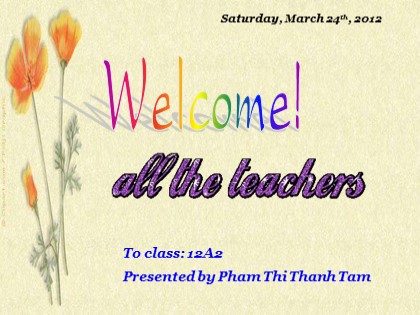Bài giảng Tiếng Anh Lớp 12 - Unit 15: Women in society - Part A: Reading
Look at the pictures and answer the questions:
1. What is the woman doing in the picture ? Where is she?
2. How many roles does this woman have?
3. Is her life typical of a Vietnamese woman’s life? Why/Why not?
Vocabulary
Civilize /'sivəlaiz/ (v) – civilization(n)
Be suited for /'sju:tid/
Doubt /daut/ (n)
Deny /di’nai/ (v)
Status /'steitəs/ (n)
Pioneer /paiə'niə/ (n)
Discriminate /dis'krimineit/ (v)
Bạn đang xem 20 trang mẫu của tài liệu "Bài giảng Tiếng Anh Lớp 12 - Unit 15: Women in society - Part A: Reading", để tải tài liệu gốc về máy hãy click vào nút Download ở trên
Tóm tắt nội dung tài liệu: Bài giảng Tiếng Anh Lớp 12 - Unit 15: Women in society - Part A: Reading

ing in sth → sự nghi ngờ Deny(v ): refuse to admit: → phủ nhận Status(n ): the social or professional position of sb → địa vị , vị trí Pioneer(n ): → người tiên phong Discriminate(v ): treat a person or group worse/better than others in an unfair way → phân biệt đối xử Vocabulary Civilize / 'sivəlaiz /(v) – civilization(n ): sự khai hóa văn minh Be suited for / 'sju:tid /: phù hợp Doubt / daut / (n): sự nghi ngờ Deny /di’nai /( v): phủ nhận Status / 'steitəs /(n): địa vị , vị trí Pioneer/ paiə'niə /(n): người tiên phong Discriminate/ dis'krimineit /(v): phân biệt đối xử WHILE YOU READ Read the text then do the tasks that follow. Throughout much of the history of human civilization , deep-seated cultural beliefs allowed women only limited roles in society. Many people believed that women’s natural roles were as mothers and wives. These people considered women to be better suited for childbearing and homemaking rather than for involvement in the public life of business or politics. Widespread doubt about women’s intellectual ability led most societies to deny education, employment and many legal and political rights to women. It was men who controlled most positions of employment and power in society. The struggle for women’s rights − the rights that establish the same social, economic, and political status for women as for men − began in the 18th century during a period known as the Age of Enlightenment . During this period, political philosophers in Europe began to argue that all individuals, male or female, were born with natural rights that made them free and equal. These pioneer thinkers advocated that women should not be discriminated against on the basis of their sex. Today, although their status varies in different countries, women in most parts of the world have gained significant legal rights. The most important of these are: the right to have equal work opportunities and pay to men, the right to vote, and the right to formal education. Human civilization Childbearing Involvement Age of Enlightenment Deep-seated cultural beliefs Homemaking Intellectual ability Equal work opportunity Cơ hội làm việc bình đẳng Việc chăm sóc gia đình Năng lực trí tuệ Việc sinh con Niềm tin văn hóa ăn sâu vào tiềm thức Thời đại khai sáng Nền văn minh nhân loại Sự tham gia Column A Column B 1. g 2. d 3. h 4. f 5. e 6. b 7. c Task 1 : Match the words or phrases in column A with the suitable meanings in column B Work in groups . Do the task 2&3 in your book on the page 164&165 and then choose the pictures Let's play a game! “Famous Women” Picture 1 Picture 2 Picture 3 Picture 4 Picture 5 Picture 6 Congratulations! Your present is a hand-clap from all your classmates 1. According to the text, what was the main role traditionally accorded to women? A. working in education B. building houses C. taking care of the house and family D. working in factories [Paragraph 1, line (2-3)] 2. Before the 18th century, what was the attitude of societies towards women’s intellectual ability? A. respectful B. supportive C. resentful D. disbelieving [Paragraph 1, line (6-7-8)] 3. According to the text, what is the purpose of the struggle for women’s rights? A. to free women from housework B. to establish a friendly relationship between men and women C. to bring equality between men and women D. to argue that women have better intellectual ability [Paragraph 2, line (1-2)] 4. What do “these pioneer thinkers” at the end of paragraph 2 refer to? A. 18th century European people B. 18th century European political philosophers C. 18th century European women D. 18th century European politicians [Paragraph 2, line (4-5-6)] 5. Which of the following is NOT mentioned in the last paragraph as one of women’s legal rights today? A. the right to hold property B. the right to equal pay C. equal employm
File đính kèm:
 bai_giang_tieng_anh_lop_12_unit_15_women_in_society_part_a_r.ppt
bai_giang_tieng_anh_lop_12_unit_15_women_in_society_part_a_r.ppt

